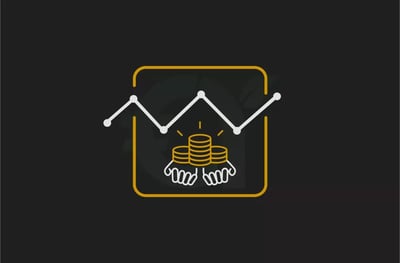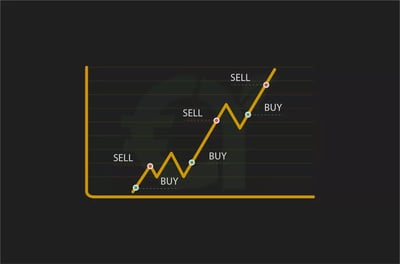Table Of Contents
- Can You Make a Living Day Trading?
- How Much Can You Make Day Trading?
- What Is the Career Longevity of a Day Trader?
- How to Day Trade for a Living: How Does Day Trading Work?
- What Do Day Traders Usually Trade?
- Pros and Cons of Day Trading for a Living
- Four Tips You Need to Know Before You Start Day Trading for a Living
- 1. KISS (Keep it simple, stupid)
- 2. Do not quit your day job
- 3. Be realistic about your profits
- 4. Capitalize on low-priced stocks
- How to Day Trade for a Living: Three Steps to Do It the Smart Way
- 1. Start With Paper Trading
- 2. Choose Your Broker
- 3. Keep a Trading Journal
- 4. Never Stop Practicing
- Top Strategies to Start Day Trading for a Living
- How to day trade for a living top strategy #1: Risk Management
- How to day trade for a living top strategy #2: Time Management
- How to day trade for a living top strategy #3: Key Levels
- The Bottom Line
How to Day Trade for a Living. Mastering Short Term Trading
By assessing market trends, more and more people are learning how to become professional day traders. Day trading is the “buying and selling of securities on the same day, often online, based on small, short-term price fluctuations.”
The intersection of sharp volatility, market activity, and considerable volumes in the financial markets makes day trading a viable option. Thus, many people are urged to learn how to adapt to this approach. At Arincen, we believe all this market activity opens a great window of opportunity to learn how to day trade for a living.
So many new traders are entering the market, and some call this the Golden Age of trading. How, then, does a person go about learning how to day trade for a living? This article covers the basics and answers common questions that may pop up. We hope you find the inspiration to center on the trading education we lay out here and better understand how to go about day trading for a living.
Day trading involves buying and selling financial instruments within the same trading day
Only a small percentage of day traders become consistently profitable and fewer still succeed in making it a full time career
Many traders start part time while keeping another income source before gradually transitioning
New traders should begin with paper trading to practise strategies risk management and execution without real capital at stake
Choosing the right broker is critical and depends on factors like platform reliability execution speed fees and access to essential tools
Ongoing practice and experience build the discipline resilience and confidence needed to handle fast paced market conditions
Core components of a successful day trading approach include strict risk control time discipline and identifying strong technical levels for entries and exits

Can You Make a Living Day Trading?
In simple terms, yes. We at Arincen know many people who day trade as their living. However, like anything else we attempt that is worthwhile, the pathway to success is not easy. If it were easy, everyone would be wealthy and no one would have a regular job. Ask any successful trader about what they do, and the response is likely to be that they traded as a side hustle for a very long time before pivoting to trading full time. What sets them apart, however, is that they have invested intense levels of energy, money, time, and work to achieve their goals, whereas most people are unwilling to pay such a price.
How Much Can You Make Day Trading?
Of course, there are traders who make millions, but they are atypical and the exception to the rule. You must remember that all trading is risky and demands dedication and hard work. Therefore, it is critical that you always begin with a solid approach.
It's crucial to understand that cases of extreme wealth are outliers. Studies indicate that only about 3% of day traders are profitable, with less than 1% achieving consistent, predictable earnings. Therefore, while substantial profits are possible, they are exceedingly rare and often accompanied by significant financial risk. Here are some of the most common questions that require answers before you start day trading for a living:
How much money will you begin trading with?
How much time do you need to put into trading and education?
What strategies will you employ to day trade?
Our response, should you ask, is that you need to begin small and trade on a part-time basis. Do not put yourself in a position where you must rely on day-trading profits to provide food for your family and cover other bills. Day trading is stressful, can cloud your judgment, and therefore could lead you to make bad trades if you fall into common psychological traps. Allow yourself the time and space to focus on developing your trading strategies and skills well.
Recommended Brokers
What Is the Career Longevity of a Day Trader?
There is no firm answer. Some day traders work their career for a lifetime; others, particularly those who do not study or properly manage their risks, can be in and out of day trading in a gloriously short career.
How to Day Trade for a Living: How Does Day Trading Work?
Essentially, trading is where you try to purchase a stock or other financial instrument at a specific price and then sell it when the price increases. This is the most basic concept because there are different and more complicated strategies to do this. In day trading, however, you do it much more frequently. Rather than purchasing a stock to hold overnight or longer, day traders complete their trades in the same day.
Day trading suits those who can dedicate full-time attention, have strong risk tolerance, and have a deep understanding of market dynamics. It is not recommended for beginners without extensive practice in demo trading and risk management strategies.
What Do Day Traders Usually Trade?
Typically, day traders deal in stocks, which could be stock in blue-chip firms such as Amazon and Microsoft or penny stocks, which are smaller and lesser-known companies. Other traders prefer to trade commodities, such as gold, silver, or crude oil; and yet, more like to trade stock groups in one of the many global indices. We should also say that FOREX day trading is extremely popular.
Pros and Cons of Day Trading for a Living
-
You are your own boss. If the daily office regime is not to your liking and you want to set your own schedule, day trading may be an option for you.
-
Financial freedom. Day trading may be an approach for savvy, dedicated traders to make extra income; it does not have to be a full-time job. If you choose to trade part time, with a small account, your gains could well add up over time.
-
Laptop lifestyle. Today, many people do not like commuting to the office. Therefore, the flexibility to work from nearly anywhere can be a major attraction.
-
Challenge and purpose. Many people just don’t like their day jobs. A pursuit like day trading can add excitement and purpose to life – particularly as you improve your skills.
-
Useful skills. If you make trading work in your situation, you always will have the skills to maneuver in the market.
-
Losing money. Day trading is risky, as is all trading. Therefore, even if you know what you are doing, mistakes are inevitable. It is always possible that you can lose more money than you anticipate.
-
Hefty time investment. If you take day trading seriously, you will be investing much time studying. Such a time investment will lead to sacrifices in other areas of your life.
-
It is difficult. You must be prepared for a long path with many lessons and failures. You certainly must love day trading and want it.
-
It can be an emotional rollercoaster. Fasten your seat belt. You will come upon many highs and lows. It is critical that you learn to manage your emotions.

Four Tips You Need to Know Before You Start Day Trading for a Living
The below four tips could help you make your journey toward day trading a roaring success.
1. KISS (Keep it simple, stupid)
Good trading should be kept simple. If you overcomplicate the process, you can make it more difficult to learn and improve. The more you simplify, the more you may find your rhythm and improve faster; and then the learning process becomes – by extension – much easier.
2. Do not quit your day job
At least in the beginning, don’t place yourself in a position to depend solely on profits from your day trading. It is more intelligent to treat your day-trading career as a side job until you build both skills and confidence.
3. Be realistic about your profits
Do not swing for the fences, which is a great way to empty your account fast. Take smaller positions that allow you more chances to win. There is no stigma in going for the smaller win; take the meat of the move and then go to the next trade.
4. Capitalize on low-priced stocks
Lean into finding value in unfancied places. Note that penny stocks usually are priced at the low end (hence “penny”) and are more accessible to traders, particularly those with small accounts. Even though you don’t need much money to get started there, you still must study and prepare. By all means, do not go in thinking penny stocks are a fast or easy way to make money.
How to Day Trade for a Living: Three Steps to Do It the Smart Way
These three pointers guide you on the best way to start day trading.
1. Start With Paper Trading
As we have emphasized, day trading is risky. You can limit your risk with the right strategy. For example, you must understand chart patterns. Don’t enter a trade only because a stock is suddenly moving. Rather, watch for patterns that can work within your own strategy. Formulate a trading plan if you see both a stock moving and it fits your set-ups. As you have more practice and develop your skills, you will identify more patterns and build more strategies for trading smart.
2. Choose Your Broker
If you are now ready to trade, you first need an account with a reputable broker. There are many. Locate one that fits your needs. Not all brokers are equal, and some are better for particular strategies.
3. Keep a Trading Journal
It is important to log your trades in a journal. Sometimes learning to day trade is like trying to drink from a fire hose; it is easy to be overwhelmed. Thus, keeping a record of what you trade will help you better organize your progress. You can better see where you need to focus to allow you to expend your time more effectively. You then can evaluate your errors and adjust accordingly. As we have stressed, so much is included in learning to day trade for a living. Because you cannot remember it all, keep a journal for reference.
4. Never Stop Practicing
Trading is all about execution. You can build the perfect trading plan with day trading and then get caught like a deer in headlights when you begin trading with real money.
Becoming a seasoned trader involves spotting chart patterns and entering and exiting trades with solid timing. Then, when situations do not go as expected, you must handle your emotions and be true to your original plan.
Nothing will replace practice and “screen time” when learning the process. Begin small and improve a little each day, which is how to build solid trading skills.
Top Strategies to Start Day Trading for a Living
Before being overwhelmed with advanced technical indicators and chart patterns, focus on the basics of “how” to day trade for a living. The basics build a foundation for understanding what works and does not, so you can learn to adapt to any market you enter. Some great starting points include support and resistance, time management, and risk management. They will be discussed in more detail below.
How to day trade for a living top strategy #1: Risk Management
Risk management is one of the most critical issues regarding day trading. Everyone who trades in stocks assumes some risk; there is no way around that. The key is to limit and contain the risks you take. By creating your own rules and process, you can reduce the risks to your trading plans and thus have a better chance of success.
How to day trade for a living top strategy #2: Time Management
There is so much to day trading. If you are not careful, you can quickly become distracted and end up wasting your day, missing a great set-up, or – even worse – losing on a trade. Day trading requires extreme focus, and time management is key.
How to day trade for a living top strategy #3: Key Levels
Important: Be aware of key levels on a stock chart. These levels support and resist price movement. Knowing these areas is valuable when making your trading plans.

The Bottom Line
Day trading for a living is only possible if you put in the time, work, and energy. At the same time, you should never give up, even if you lose money at first. A lot will depend on the broker you select. Choosing the best day-trader broker comes down to how they measure up in such key areas as liquidity, speed of execution, financial stability, and reliability. It is possible for day trading to be very lucrative, but considerable practice and application are required to reach a level where you are earning consistent profits.
Although it is fair to state that choosing a good broker will not be the sole reason you succeed, you will need to do your part as a studious and responsible trader. At the same time, choosing the wrong broker can go a long way toward setting you up for failure. That is, if you do not have fast execution speeds, good liquidity, and quality market data, your chances for success will diminish.
Recommended Brokers
FAQ
Simply put, day trading involves the buying and selling of securities on the same day, often online, based on small, short-term price fluctuations.
Harsh as it sounds, most traders lose. If you are serious about becoming a day trader, understand that it will require a lot of work and a long time. This must be a passion for you, so you are inspired to continue learning.
Sadly, no. Day trading requires dedication and skill and most people do not put in the time and effort to make it work for them.
Becoming a day trader with $100 is not very different from beginning with $1,000, except that you must choose a broker with a lower account minimum. Once you are ready to trade, be ready to trade small. Seek low-priced penny stocks to practice and build up your account.






